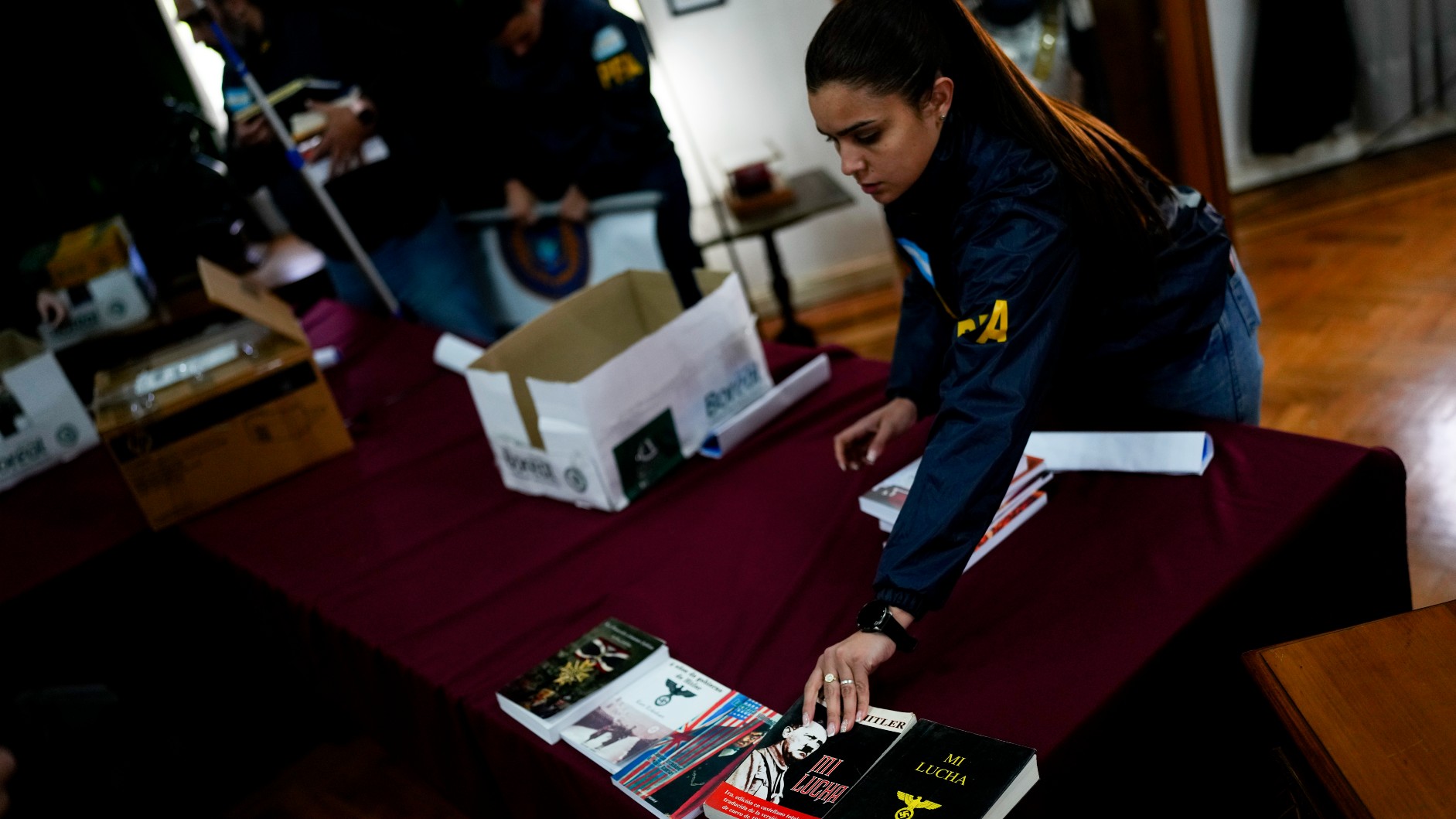Argentinian police arrest biggest online distributor of Nazi propaganda
Officials seized hundreds of texts glorifying Adolf Hitler, denying Holocaust and bearing swastikas

A free daily email with the biggest news stories of the day – and the best features from TheWeek.com
You are now subscribed
Your newsletter sign-up was successful
Argentina's federal police have raided and closed down an online bookshop that sold Nazi content and material after a two-year investigation.
Police found "hundreds of books plastered with swastikas" when they raided a home in San Isidro, on the outskirts of Buenos Aires, said The Washington Post, some of which "glorified Adolf Hitler" while others denied the Holocaust. According to officials, it was the largest seizure of Nazi propaganda materials in recent Argentinian history.
More than 200 texts in total were produced by a "prolific" clandestine printing press, known as Librería Argentina.
The Week
Escape your echo chamber. Get the facts behind the news, plus analysis from multiple perspectives.

Sign up for The Week's Free Newsletters
From our morning news briefing to a weekly Good News Newsletter, get the best of The Week delivered directly to your inbox.
From our morning news briefing to a weekly Good News Newsletter, get the best of The Week delivered directly to your inbox.
The online bookshop's alleged owner, a 45-year-old man who has not been identified, was arrested after police raided his parents' home. The raid "was the tipping point" in an investigation that began in 2021, said The Washington Post, after the Delegation of Israelite Associations of Argentina (DAIA), who represent the country's Jewish population, "raised alarms".
"We're still astonished by the amount of material," federal police chief Juan Carlos Hernández said. "It's historic. It's truly a printing press disseminating and selling Nazi symbology, books and indoctrination." The arrested man, Hernández said, sold "high-quality material" and had "a high level of purchases and inquiries".
Librería Argentina sold books with "images of swastikas, iron crosses and the imperial eagle" of the Nazi party, said Reuters, as well as "Nazi propaganda texts". Displaying Nazi symbols is a crime in Argentina.
"We are shocked by how profuse the material is," said Marcos Cohen from the DAIA. "I don't remember anything like this being found before."
A free daily email with the biggest news stories of the day – and the best features from TheWeek.com
According to El País, the man was "operating as Argentina's largest Nazi material distributor from his family home". The investigation began when the DAIA made a complaint about a website disseminating antisemitic content and selling it through Mercado Libre, South America's foremost e-commerce platform. Police said the man's account was terminated, but he began to sell the materials through his own website.
Argentina has the largest Jewish population in Latin America, with many moving there after their expulsion from Spain and pogroms in Eastern Europe, and during the Nazis' rise to power before the Second World War. After the Nazis were defeated, many of their officials also emigrated to Argentina to avoid trials for war crimes.
Harriet Marsden is a senior staff writer and podcast panellist for The Week, covering world news and writing the weekly Global Digest newsletter. Before joining the site in 2023, she was a freelance journalist for seven years, working for The Guardian, The Times and The Independent among others, and regularly appearing on radio shows. In 2021, she was awarded the “journalist-at-large” fellowship by the Local Trust charity, and spent a year travelling independently to some of England’s most deprived areas to write about community activism. She has a master’s in international journalism from City University, and has also worked in Bolivia, Colombia and Spain.
-
 Political cartoons for February 19
Political cartoons for February 19Cartoons Thursday’s political cartoons include a suspicious package, a piece of the cake, and more
-
 The Gallivant: style and charm steps from Camber Sands
The Gallivant: style and charm steps from Camber SandsThe Week Recommends Nestled behind the dunes, this luxury hotel is a great place to hunker down and get cosy
-
 The President’s Cake: ‘sweet tragedy’ about a little girl on a baking mission in Iraq
The President’s Cake: ‘sweet tragedy’ about a little girl on a baking mission in IraqThe Week Recommends Charming debut from Hasan Hadi is filled with ‘vivid characters’
-
 Epstein files topple law CEO, roil UK government
Epstein files topple law CEO, roil UK governmentSpeed Read Peter Mandelson, Britain’s former ambassador to the US, is caught up in the scandal
-
 Iran and US prepare to meet after skirmishes
Iran and US prepare to meet after skirmishesSpeed Read The incident comes amid heightened tensions in the Middle East
-
 Israel retrieves final hostage’s body from Gaza
Israel retrieves final hostage’s body from GazaSpeed Read The 24-year-old police officer was killed during the initial Hamas attack
-
 China’s Xi targets top general in growing purge
China’s Xi targets top general in growing purgeSpeed Read Zhang Youxia is being investigated over ‘grave violations’ of the law
-
 Panama and Canada are negotiating over a crucial copper mine
Panama and Canada are negotiating over a crucial copper mineIn the Spotlight Panama is set to make a final decision on the mine this summer
-
 Why Greenland’s natural resources are nearly impossible to mine
Why Greenland’s natural resources are nearly impossible to mineThe Explainer The country’s natural landscape makes the task extremely difficult
-
 Iran cuts internet as protests escalate
Iran cuts internet as protests escalateSpeed Reada Government buildings across the country have been set on fire
-
 US nabs ‘shadow’ tanker claimed by Russia
US nabs ‘shadow’ tanker claimed by RussiaSpeed Read The ship was one of two vessels seized by the US military